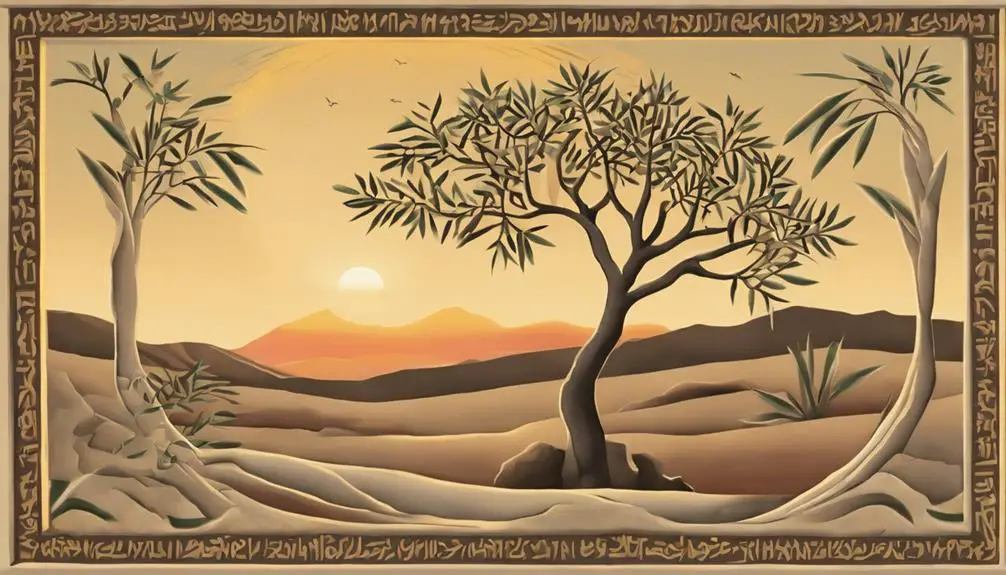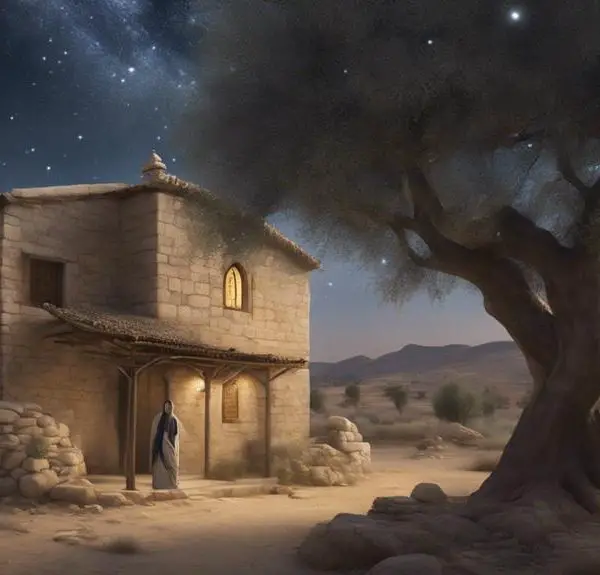Uncover the profound symbolism of the number 8 in biblical texts, revealing mysteries of new beginnings and eternal life.

Significance of 8 in the Bible
Have you ever wondered if there's more to the number 8 in the Bible than meets the eye?
This digit isn't just another number; it's woven into the very fabric of biblical narratives, symbolizing new beginnings and eternal life.
From the creation week to the story of Noah and the significance of circumcision on the eighth day, this number holds a profound spiritual significance.
As we explore its role in Resurrection Day and biblical feast days, you'll see how deeply embedded the number 8 is in the scriptural tradition.
The insights you'll uncover may just transform your understanding of these ancient texts.
Key Takeaways
- Circumcision on the eighth day signifies new beginnings and a lasting covenant with God.
- Noah's Ark story emphasizes salvation and a fresh start for humanity with eight survivors.
- The number 8 symbolizes renewal and hope, as seen in Biblical narratives and feast days.
- Resurrection Day, falling on the first day of the week, represents a new creation and victory over death, echoing the theme of "eight" as a new beginning.
The Creation Week

The Creation Week, as outlined in Genesis, marks the foundational narrative in which God systematically constructs the universe in six days and rests on the seventh, underscoring the significance of both completion and rest within biblical cosmology. This genesis narrative, pivotal to Judeo-Christian beliefs, not only delineates the origins of the cosmos but also sets a precedent for Sabbath observance, emphasizing a rhythm of work and rest integral to human existence.
Delving into the analytical depths of this narrative, you'll find that the sequence of creation isn't arbitrary. Each day's act of creation builds upon the previous, showcasing a divine order and intentionality. This meticulous arrangement culminates in the sanctification of the seventh day, a day of rest, which God blesses and makes holy. This establishes a pattern for Sabbath observance, a practice that serves as a weekly reminder of God's creative work and His call for humanity to rest.
In this context, the Genesis narrative isn't just a story of the world's beginnings; it's a blueprint for living. Sabbath observance, rooted in the creation week, becomes a profound expression of faith and a testament to the rhythm of divine order imprinted upon the universe.
Noah's Ark Survivors

In examining Noah's Ark survivors, it's crucial to understand the selective preservation of life through divine intervention as depicted in Genesis. This narrative isn't merely an account of survival but embodies profound principles of family salvation and divine preservation. The survival of Noah's family underscores the significance of faithfulness and obedience to divine commands.
Here are key points to consider:
- Family salvation: Noah's family was saved due to his righteousness. This underscores the concept that divine grace can extend to an individual's household based on their faith and obedience.
- Divine preservation: The ark represents God's means of preserving life amidst destruction, illustrating His power to save and sustain.
- Selective preservation: The narrative highlights that survival wasn't random but a result of divine selection, based on moral and spiritual criteria.
- A new beginning: The survivors were given the responsibility to repopulate and steward the earth, symbolizing a new start under God's covenant.
Analyzing these points, it's clear that the story of Noah's Ark survivors goes beyond mere historical account, serving as a theological foundation for understanding divine intervention, family salvation, and the importance of living a life aligned with divine principles.
Circumcision Covenant

Understanding the Circumcision Covenant is essential as it marks a significant moment in biblical history, where God establishes a physical sign of faith and commitment with Abraham and his descendants. This act not only signifies a divine agreement but also sets the foundation for cultural practices within Abrahamic faiths.
Aspect |
Significance |
|---|---|
Covenant |
A binding agreement between God and Abraham. |
Sign |
Circumcision as a physical manifestation of faith. |
Age |
Performed on the eighth day, symbolizing new beginnings. |
Heritage |
Passed down through generations as a mark of identity. |
Faiths |
Integral to Jewish, Christian, and Islamic traditions. |
In examining this covenant, it's clear that it's more than a mere ritual; it's a deeply embedded cultural practice that has influenced Abrahamic faiths for millennia. By requiring circumcision on the eighth day, the act takes on a symbolic meaning of commitment and renewal, underlining the relationship between the divine and the faithful. This tradition, while varying in interpretation and practice among different faiths, remains a cornerstone in understanding the complex interplay between religion and culture. Through this lens, the Circumcision Covenant isn't just a historical event but a living testament to faith's enduring power to shape cultural norms and identities.
Resurrection Day

Markedly, Resurrection Day stands as a pivotal moment in Christian theology, symbolizing Jesus Christ's victory over death and his promise of eternal life for believers. This event not only underscores the foundation of Christian faith but also embodies the essence of hope and renewal for Early Christians. Following his resurrection, Jesus' appearances to his disciples and followers served to strengthen their faith, ensuring the spread of Christianity throughout the world.
The implications of Resurrection Day extend far beyond its initial religious context, offering:
- A testament to Jesus' divine authority: His resurrection validates his teachings and miracles, affirming his identity as the Son of God.
- A foundation for Christian doctrine: This event forms the cornerstone of Christian belief, emphasizing the significance of faith in Jesus for eternal salvation.
- A source of hope for believers: It provides assurance that death isn't the end but a transition to eternal life with God.
- An inspiration for Early Christians: Jesus' appearances after his resurrection galvanized his followers, fueling the rapid expansion of Christianity.
Analyzing Resurrection Day in this light reveals its profound impact on both the theological and historical development of the Christian faith, underscoring its central role in shaping the beliefs and practices of Early Christians.
Biblical Feast Days

Reflecting on Resurrection Day's significance, it's essential to explore Biblical Feast Days, which also hold profound implications for Christian faith and practice. The Passover observance, for instance, is intricately linked with the concept of redemption and liberation, a theme central to both Jewish and Christian traditions. Analyzing the Feast timing, one discovers a calendar rich with symbolic meaning, designed to align followers' lives with the rhythm of divine events.
The Passover, taking place in the spring, symbolizes renewal and deliverance. It's the first of the seven major feasts, setting a tone of redemption that resonates through the subsequent celebrations. This timing is no coincidence; it reflects a deliberate structure meant to remind believers of God's ongoing role in human history. Moreover, the Passover's proximity to Resurrection Day underscores the connection between the Old and New Testament narratives, linking the liberation from Egypt to the liberation from sin and death.
Understanding these feasts' timing and thematic elements enriches one's appreciation of biblical narratives. It encourages a holistic view of faith, where historical observances and theological principles intertwine, offering a deeper insight into the continuity and depth of biblical teaching.
Frequently Asked Questions
How Does the Number 8 Relate to New Beginnings or Rebirth in Biblical Numerology Outside of the Contexts Already Mentioned?
In biblical numerology, the number 8 symbolizes new beginnings or rebirth beyond the contexts you're familiar with.
For instance, the Eight Beatitudes in the New Testament represent fundamental teachings that introduce a new covenant, hinting at spiritual renewal and rebirth.
Similarly, the concept of the 'Eighth Day' signifies a new creation, beyond the traditional seven-day week, symbolizing a fresh start or a new era for humankind.
Are There Any Significant Biblical Figures Associated With the Number 8 Who Are Not Related to the Creation Week, Noah's Ark, Circumcision Covenant, Resurrection Day, or Biblical Feast Days?
You're exploring biblical figures linked to the number 8, beyond well-known contexts. Interestingly, King David's sons and Ishmael's descendants offer insight.
King David, a pivotal figure, had at least 8 sons, highlighting a connection to renewal and dynastic legacy. Similarly, Ishmael fathered 12 princes, but his association with the number 8 comes through genealogical patterns, emphasizing multiplication and growth.
These examples reflect subtle yet significant ties to the concept of new beginnings.
Can the Number 8 Be Found in the Architectural Design or Dimensions of the Tabernacle or Solomon's Temple, and What Is Its Significance if So?
You're exploring whether the number 8 appears in the design of the Tabernacle or Solomon's Temple and its potential symbolism.
While the explicit mention of the number 8 isn't found in their architectural details, the underlying themes of renewal and new beginnings—often symbolized by 8—could be inferred through Tabernacle symbolism and Solomon's wisdom in constructing the Temple.
These structures themselves represent a new covenant and wisdom, aligning with the broader thematic resonance of the number 8.
How Does the Concept of the Number 8 in the Bible Influence Christian Practices or Beliefs Outside of the Specific Events Listed?
You'll find that Christian practices and beliefs are influenced by the concept of the number 8 beyond specific biblical events.
For instance, Christian baptism is symbolically linked to new beginnings, resonating with the eighth day, which signifies new creation and renewal.
Similarly, the concept of Sabbath rest, traditionally on the seventh day, is transcended in Christian tradition by the first day, seen as the eighth day, symbolizing a new era under Christ's resurrection.
In Biblical Prophecy, Does the Number 8 Hold Any Symbolic Meaning or Significance That Is Not Directly Connected to the Mentioned Topics?
You're exploring if the number 8 carries symbolic weight in biblical prophecy beyond specific events. Indeed, it does.
The 'Eight Kings Prophecy' and various prophetic patterns underscore its importance. These references aren't just random; they're deliberately woven into the narrative to highlight themes of renewal and new beginnings.
Analyzing these patterns, you'll uncover layers of meaning that reinforce the number 8's spiritual significance within a prophetic context.
Conclusion
In analyzing the biblical significance of the number 8, it's clear that it symbolizes new beginnings and divine perfection. From the Creation Week to the story of Noah, the Circumcision Covenant, and the Resurrection Day, this number recurrently marks transitions and covenants.
Additionally, its presence in Biblical Feast Days underscores its importance in the framework of divine order and redemption. Thus, the number 8 serves as a profound symbol of renewal and eternal perfection within the biblical narrative.



Sign up